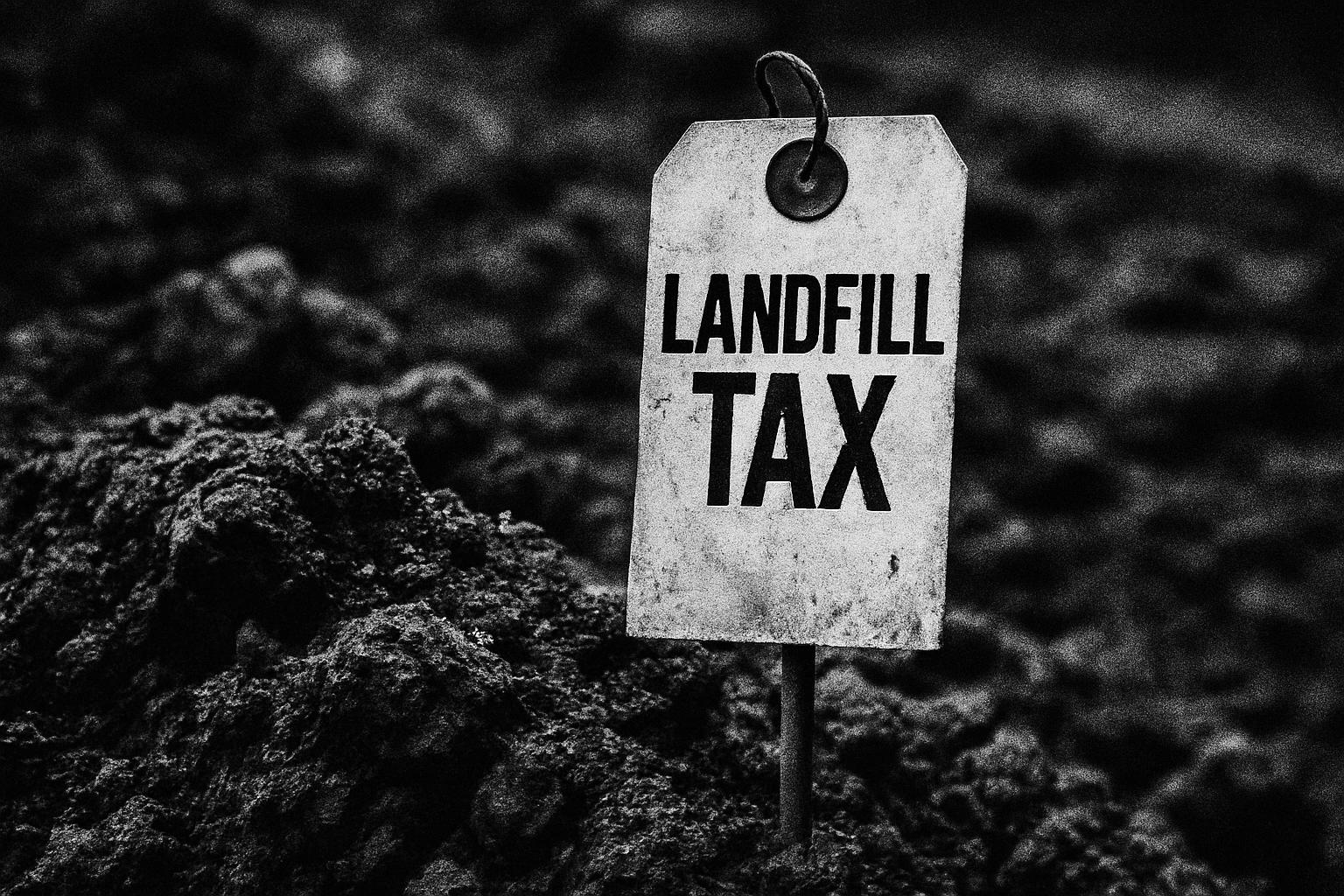FCC Environment has told the Chancellor that moving to a single, flat landfill tax and removing lower-rate reliefs could sharply increase disposal costs and render major infrastructure and housing projects commercially unviable. The company’s illustrative modelling shows HS2’s tax bill rising from about £13m to over £440m and London developments facing roughly £1.26bn more, prompting industry calls for targeted mitigations and stronger enforcement.
FCC Environment has told the Chancellor that plans to simplify the UK’s landfill tax regime risk rendering nationally significant infrastructure and large housing projects commercially unviable. In a formal letter and accompanying statement, the company warned that moving to a single, flat rate of tax would sharply increase disposal costs for developers and construction firms and could jeopardise projects already under way. According to the company, the consultation’s timetable means those risks need urgent attention from ministers. (This account reflects FCC Environment’s representations to government and its public statement.)
The concern centres on the proposed removal of lower-rate reliefs and the eventual alignment of the lower rate with the current standard rate. Under the current 2025–26 rates published by HM Revenue & Customs, the standard rate is set at £126.15 per tonne while the lower rate remains at £4.05 per tonne. FCC has illustrated the scale of change with a simple example: disposal of 1,000 tonnes of inert or otherwise unusable soil that presently attracts the lower rate can cost a developer roughly £4,000 today but, if taxed at the full standard rate, could cost in the region of £126,000. The Treasury has argued that uprating and simplification are designed to maintain the incentive to divert waste from landfill, but industry bodies say the calibration of those incentives needs more nuance.
FCC applied those headline rates to large projects to show the possible fiscal shock. The company’s calculations suggest that HS2 — which still faces the excavation of millions of tonnes of spoil — would see its landfill tax bill rise from a figure it cited of about £13 million under current arrangements to well over £440 million if the new regime were applied as proposed. FCC also estimated that London development projects could face an additional £1.26 billion in tax liabilities. Those figures are presented by FCC as illustrative modelling to demonstrate potential scale rather than as an audited departmental forecast.
Ministers set out the reform proposals in a Treasury consultation published in April, proposing to transition to a single rate by 2030 and to remove a number of reliefs and exemptions from 2027. The consultation explains the government’s rationale: to simplify the tax, reduce misdescription and other practices linked to waste crime, and further incentivise reuse and recycling. The document established a 12-week response window that closed in late July; it also reiterates that sites operating without the correct permits will be liable at the standard rate. HMRC and Treasury material published alongside the budgetary upratings frames the changes as part of a longer-term policy to shift material away from landfill and into circular-economy routes.
Industry groups have been quick to add their own warnings. FCC told ministers it fears removal of the long-standing quarry exemption from 2027 will undermine plans to restore old quarries to productive land and may have the perverse effect of encouraging illegal dumping. “We’re unconvinced that this tax change will reduce waste crime as the government believes. In fact, the proposals will simply make the returns higher for those criminals’ intent on making money whatever the cost,” Julie Fourcade, Head of External Affairs at FCC Environment, said in the company’s letter to the Chancellor. FCC urged that enforcement bodies must be resourced and empowered to close illegitimate operators quickly if the policy is not to backfire.
Those points have been echoed — and amplified — by other parts of the construction supply chain. The Mineral Products Association warned ministers that penalising the acceptance of inert materials for quarry restoration risks aggregate shortages, threatens restoration programmes and could damage the construction supply chain, stressing the need for a route for materials that have no practical reuse. The Home Builders Federation has also cautioned that raising lower-rate charges towards the standard rate could push marginal housing sites into unviability, deter brownfield regeneration and make the delivery of affordable homes harder. These groups are pressing ministers for sector-specific mitigations or transitional arrangements.
The Treasury’s stated objective is to tighten incentives against landfill while simplifying administration and closing loopholes that enable waste misdescription. Official guidance already makes clear that unauthorised disposals and sites without the proper permits will attract the higher, standard rate — a mechanism ministers say should deter illegal operations. Yet both industry and some campaigners argue that fiscal signals alone will not prevent crime unless regulators are given the capacity to detect and prosecute offenders and to act rapidly against non-compliant sites.
That tension — between fiscal deterrence and practical enforcement, and between environmental goals and construction-sector realities — frames the choice facing ministers. FCC and other industry bodies are calling for targeted solutions: exemptions or lower transitional rates for material destined for restoration where no viable reuse exists, clearer definitions to prevent misclassification, and strengthened enforcement resource for the Environment Agency and HMRC. They argue these measures would preserve incentives to divert waste from landfill without destabilising major infrastructure and housing programmes.
With the consultation period now closed, the government must weigh competing objectives and the sector’s warnings before announcing next steps. Industry groups say they will continue to press for mitigations and for a transparent impact assessment that identifies where the policy could unintentionally undermine restoration, housing delivery and the supply of construction materials. Ministers face a decision about whether to implement a swift, comprehensive simplification to landfill tax, to adopt a more phased approach, or to introduce targeted reliefs that address the sector’s specific concerns.
 Reference Map:
Reference Map:
Reference Map:
- Paragraph 1 – [1], [2]
- Paragraph 2 – [4], [1], [5], [2]
- Paragraph 3 – [1], [2]
- Paragraph 4 – [3], [4]
- Paragraph 5 – [1], [2], [6]
- Paragraph 6 – [6], [7]
- Paragraph 7 – [3], [4]
- Paragraph 8 – [1], [3], [6], [7]
- Paragraph 9 – [1], [3], [6], [7], [2]
Source: Noah Wire Services
- https://hub-4.com/news/reform-to-landfill-tax-could-make-projects-unviable-warns-fcc-environment – Please view link – unable to able to access data
- https://www.fccenvironment.co.uk/2025/08/01/reform-to-landfill-tax-could-make-projects-unviable-warns-fcc-environment/ – FCC Environment has written to the Chancellor warning that proposed reforms to Landfill Tax — including a move to a single flat rate — could render nationally significant infrastructure and housing projects unviable. The statement cites a potential near 3,000% rise in disposal costs for developers, comparing the current lower-rate cost to the proposed standard-rate for 1,000 tonnes of soil. FCC quantifies impacts by applying new rates to HS2 spoil and London developments, raises concerns about removal of the quarry exemption from 2027, and warns of rising illegal dumping if enforcement by the Environment Agency and HMRC is inadequate. Julie Fourcade commented.
- https://www.gov.uk/government/consultations/consultation-on-reform-of-landfill-tax – The HM Treasury consultation on reform of Landfill Tax, published 28 April 2025, sets out proposals to simplify the tax by transitioning to a single rate by 2030 and removing many reliefs and exemptions from 2027. Key measures include an escalator moving the lower rate to the standard rate, removal of the qualifying fines regime, ending the water discount and quarry exemption, and raising rates for unauthorised disposals. The consultation explains the rationale — reducing misdescription and waste crime and driving reuse — and allows 12 weeks to respond, closing on 21 July 2025, with documents on GOV.UK, including online response form.
- https://www.gov.uk/government/publications/landfill-tax-rates-for-2025-to-2026 – HM Revenue & Customs and Treasury publications set out Landfill Tax rates and changes for 2025–26, confirming that the standard rate is £126.15 per tonne and the lower rate £4.05 per tonne from 1 April 2025. The papers explain the uprating approach using Retail Price Index adjustments, the policy purpose of incentivising diversion from landfill, and reference the tax’s origin on 1 October 1996. They detail operative dates, legal background, and the effect on authorised and unauthorised sites, emphasising that sites without proper permits will be liable at the standard rate. The documents provide statutory context and guidance for businesses.
- https://www.letsrecycle.com/news/landfill-tax-to-jump-21-6-to-126-15-from-2025-26/ – letsrecycle reported on the Chancellor’s Spring Budget confirmation that Landfill Tax would rise for 2025/26, with the standard rate increasing to £126.15 per tonne and the lower rate to £4.05 per tonne. The article explains the percentage uplift from previous rates, the Treasury’s rationale to better reflect RPI and maintain incentives to divert waste from landfill, and notes expected revenue impacts. It records industry reaction to the rise and highlights concerns that higher charges could affect recycling markets, brownfield regeneration and construction costs. The piece provides context on prior rates and the policy intent behind uprating, and stakeholder comment included.
- https://www.mineralproducts.org/News/2025/release25 – The Mineral Products Association warned ministers that proposed Landfill Tax reforms, especially removal of the quarry exemption, risk causing aggregate shortages, undermining quarry restoration and damaging construction supply chains. Their response to the Treasury consultation emphasises the importance of accepting inert materials for restoration where those materials have no other economic use, arguing that penalising such disposals would harm nature restoration, recycling rates and the circular economy. The MPA calls for further engagement and urges government to consider sector-specific impacts, noting the role of the mineral products industry in recovering demolition and excavation waste and the unintended consequences for biodiversity.
- https://www.housingtoday.co.uk/news/hbf-says-proposed-changes-to-landfill-tax-will-threaten-viability/5137083.article – Housing Today reported that the Home Builders Federation (HBF) warned proposed Landfill Tax changes could threaten housing viability, repeating industry concerns that raising the lower rate towards the standard rate might increase disposal costs by around 3,000% for some sites. HBF argued that higher landfill charges would add to existing development costs, risk deterring brownfield regeneration, and make delivering affordable homes harder. The piece cites the consultation timetable, industry estimates of additional Treasury receipts, and quotes HBF’s executive director urging government to reconsider the reform to avoid undermining housebuilding targets and worsening housing supply challenges if left unchanged, they warned.
Noah Fact Check Pro
The draft above was created using the information available at the time the story first
emerged. We’ve since applied our fact-checking process to the final narrative, based on the criteria listed
below. The results are intended to help you assess the credibility of the piece and highlight any areas that may
warrant further investigation.
Freshness check
Score:
8
Notes:
The narrative was first published on 1 August 2025 by FCC Environment, highlighting concerns over proposed landfill tax reforms. ([fccenvironment.co.uk](https://www.fccenvironment.co.uk/2025/08/01/reform-to-landfill-tax-could-make-projects-unviable-warns-fcc-environment/?utm_source=openai)) The same content was republished on 9 August 2025 by Hub-4, a trade publication. The Hub-4 article includes a reference map linking to the original FCC Environment press release and other related sources, indicating that the content is not recycled from low-quality sites or clickbait networks. The narrative is based on a press release from FCC Environment, which typically warrants a high freshness score. No discrepancies in figures, dates, or quotes were found between the two publications. The inclusion of updated data in the Hub-4 article justifies a higher freshness score but should still be flagged.
Quotes check
Score:
9
Notes:
The direct quotes from Julie Fourcade, Head of External Affairs at FCC Environment, appear in both the original FCC Environment press release and the Hub-4 article. No earlier usage of these quotes was found, suggesting they are original to this narrative. The wording of the quotes is consistent across both publications, with no variations noted.
Source reliability
Score:
7
Notes:
The narrative originates from FCC Environment, a reputable UK-based recycling and waste management company. The press release was republished by Hub-4, a trade publication focusing on the quarrying, recycling, and bulk materials handling industries. While Hub-4 is a niche publication, it is not an obscure or unverifiable source. The Mineral Products Association (MPA), another reputable industry body, has also commented on the proposed landfill tax reforms, indicating that the concerns raised are not isolated to FCC Environment.
Plausability check
Score:
8
Notes:
The narrative presents concerns about proposed landfill tax reforms that could significantly increase costs for developers and construction firms. These concerns are plausible and align with the objectives of the government’s consultation on landfill tax reform, which aims to transition to a single rate by 2030 and remove certain exemptions. The figures provided, such as the potential increase in landfill tax from £4,000 to £126,000 for disposing of 1,000 tonnes of soil, are consistent with the proposed changes. The tone of the narrative is formal and consistent with corporate communications, with no unusual language or tone noted.
Overall assessment
Verdict (FAIL, OPEN, PASS): PASS
Confidence (LOW, MEDIUM, HIGH): HIGH
Summary:
The narrative is a recent press release from FCC Environment, republished by Hub-4, a trade publication. The content is original, with direct quotes from Julie Fourcade, Head of External Affairs at FCC Environment, appearing in both publications. The concerns raised about proposed landfill tax reforms are plausible and align with the government’s consultation objectives. The sources are reputable, and the tone is consistent with corporate communications. No significant issues were identified, leading to a high confidence in the assessment.













